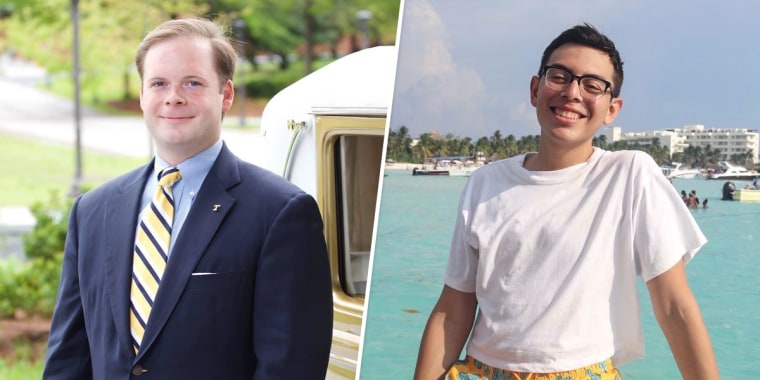New SAMHSA Report Underscores the Harms of Conversion Therapy & Importance of Affirmation for LGBTQ Young People’s Mental Health
The Trevor Project, the leading suicide prevention organization for LGBTQ young people, and Born Perfect, the National Center for Lesbian Rights’ program to end conversion therapy, released the following statements in response to the Substance Abuse and Mental Health Services Administration’s (SAMHSA) new report published today: “Moving Beyond Change Efforts: Evidence and Action to Support and Affirm LGBTQI+ Youth.”
Statement from Kasey Suffredini (he/him), Vice President of Advocacy and Government Affairs for The Trevor Project:
“These latest report findings punctuate much of what we already know about the dangerous and discredited practice of so-called conversion ‘therapy’: it doesn’t work, it is associated with poor mental health outcomes and increased suicide risk, and tragically — it’s still happening.
“Our research has found that 17% of LGBTQ youth in the U.S. reported being threatened with or subjected to conversion therapy — including more than 1 in 5 transgender and nonbinary youth. In addition to being dangerous and detrimental for the young people who undergo it, the harms associated with conversion therapy — such as substance abuse and suicide attempts — cost the U.S. billions of dollars each year.
“As we continue to defend LGBTQ young people, especially trans young people, against a record number of political attacks at the state level, we are grateful to the federal government for sending a powerful message to every LGBTQ young person that they should be proud of who they are and deserve access to affirming environments and care. We are committed to building upon this momentum to protect LGBTQ young people from conversion therapy in every state, and create a safe, accepting world for the transgender community.”
Statement from Mathew Shurka (he/him), Co-Founder of Born Perfect:
“This landmark report is based on a comprehensive survey of existing research, including many new studies and data that have been generated in the eight years since HHS first issued a report on this topic. As the report confirms, conversion therapy causes lasting harm to LGBTQ young people, including by separating them from their families and, for many youths, putting them at risk of depression and suicidality.
“Both as a survivor who was subjected to conversion therapy for five years as a minor and as an advocate on this issue, I am grateful to HHS for compiling this important report and for providing this critical information to families, providers, and policymakers. It is past time for these deadly practices to end.”
Key Takeaways from the Report:
- No available research supports the claim that sexual orientation and gender identity (SOGI) change efforts are beneficial to children, adolescents, or families.
- Available research indicates that SOGI change efforts are not effective in altering sexual orientation. Further, no available research indicates that change efforts are effective in altering gender identity.
- Available research indicates that SOGI change efforts can cause significant harm.
- SOGI change efforts are inappropriate, ineffective, and harmful practices that should not be provided to children and adolescents.
- The report also includes recommendations about how families, policymakers, and healthcare providers can support LGBTQ youth, including by ensuring that transgender youth can receive the medically necessary care they need.
Research from The Trevor Project cited in the report:
- A 2020 peer-reviewed study published in the American Journal of Public Health found that youth who reported undergoing conversion therapy were more than twice as likely to report having attempted suicide and more than 2.5 times as likely to report multiple suicide attempts in the past year.
- A 2020 peer-reviewed study published in the Journal of Adolescent Health found that transgender and nonbinary youth were 2 to 2.5 times as likely to experience depressive symptoms, seriously consider suicide, and attempt suicide compared to their cisgender LGBQ peers.
- A 2020 peer-reviewed study published in the Journal of Adolescent Health, found that transgender and nonbinary youth who report experiencing discrimination based on their gender identity had more than double the odds of attempting suicide in the past year compared to those who did not experience discrimination based on their gender identity.
- A 2021 peer-reviewed study published in LGBTQ Health found that LGBTQ youth who reported high levels of sexual orientation acceptance from any adult had nearly 40% lower odds of a past-year suicide attempt compared with LGBTQ peers with little to no acceptance.
- A 2021 peer-reviewed study published in Transgender Health found that transgender and nonbinary youth who reported gender identity acceptance from adults and peers had significantly lower odds of attempting suicide in the past year.
- A 2021 peer-reviewed study published in the Journal of Adolescent Health found that gender-affirming hormone therapy is significantly related to lower rates of depression, suicidal thoughts, and suicide attempts among transgender and nonbinary youth.
- A 2022 peer-reviewed study published in JAMA Pediatrics found the practice of conversion therapy on LGBTQ youth, and its associated harms – such as substance abuse and negative mental health outcomes, including depression, anxiety, and suicide attempts – cost the U.S. an estimated $9.23 billion, annually.
###
Born Perfect is a survivor-led campaign created by the National Center for Lesbian Rights (NCLR) in 2014 to end conversion therapy by passing laws across the country that protect LGBT children and young people, fighting in courtrooms to ensure their safety, and raising awareness about the serious harms caused by these dangerous practices. http://bornperfect.org/
If you or someone you know needs help or support, The Trevor Project‘s trained crisis counselors are available 24/7 at 1-866-488-7386, via chat at TheTrevorProject.org/Get-Help, or by texting START to 678678.

